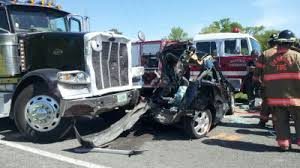In an investigative attempt to find the common causes of tractor trailer or eighteen wheeler accidents that all too often result in injury and even tragedy, national safety organizations have  identified a prevailing causation. The U.S. Department of Transportation’s Federal Motor Carrier Safety Administration (FMCSA), which works closely with the commercial trucking industry to track the rates of trucking accidents, has found that of the 5,000 yearly driver deaths resulting from collisions, over a quarter or 1,400 are attributed to obstructive sleep apnea (OSA) that results in drowsiness.
identified a prevailing causation. The U.S. Department of Transportation’s Federal Motor Carrier Safety Administration (FMCSA), which works closely with the commercial trucking industry to track the rates of trucking accidents, has found that of the 5,000 yearly driver deaths resulting from collisions, over a quarter or 1,400 are attributed to obstructive sleep apnea (OSA) that results in drowsiness.
Bottom line is a sleep deprived person suffering from untreated obstructive sleep apnea behind the wheel of a car, truck or bus is a perfect storm recipe for disaster. The FMCSA makes it clear that drivers who have a medical history that could potentially “interfere with their ability to drive safely cannot be medically qualified to operate a commercial motor vehicle in interstate commerce.” But the reality is the admonitions safety boards and even state and federal regulations are too often ignored.
As a condition, sleep apnea keeps people from achieving the level of sleep they require to function properly by causing the person to quit breathing multiple times during the night. Specifically, obstructive sleep apnea occurs when a person’s airway becomes blocked by collapsed soft tissue in the throat. This interrupts breathing, causing the person to wake gasping for breath. These breathing issues can occur hundreds of times per night, depriving victims’ organs of vital oxygen and leaving them exhausted during the day. It’s this exhaustion during work hours that makes driving heavy equipment so dangerous.
A study of active commercial truck drivers conducted by the University of Pennsylvania Center for Sleep and Respiratory Neurobiology revealed the following about the 406 drivers selected to participate in their overnight sleep study:
- 7% had severe sleep apnea
- 8% had moderate sleep apnea
- 21% had mild sleep apnea
The study researchers noted that the prevalence of sleep apnea depended on the relationship of two critical factors: age and the degree of obesity as measured by Body Mass Index, or BMI. As age and BMI increased, so did sleep apnea. A follow up study, Harvard researchers confirmed the University of Pennsylvania findings that obesity is often linked with commercial truck drivers who have sleep apnea.
With obstructive sleep apnea contributing to a such a significant percentage of trucking accidents, it’s important to be cautious on the Tennessee roads which is always chocked full of commercial trucks . If you are involved in a crash with a commercial truck or eighteen wheeler resulting in injury, you should seek the services of an experienced personal injury lawyer. Contact attorney Michael Shipman to schedule your consultation.


